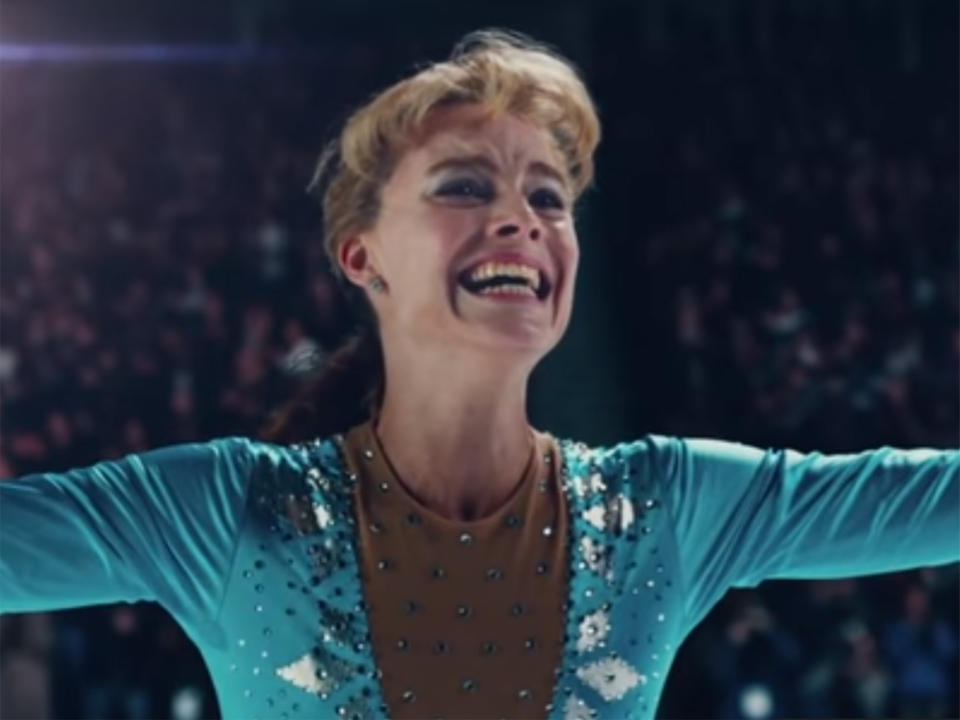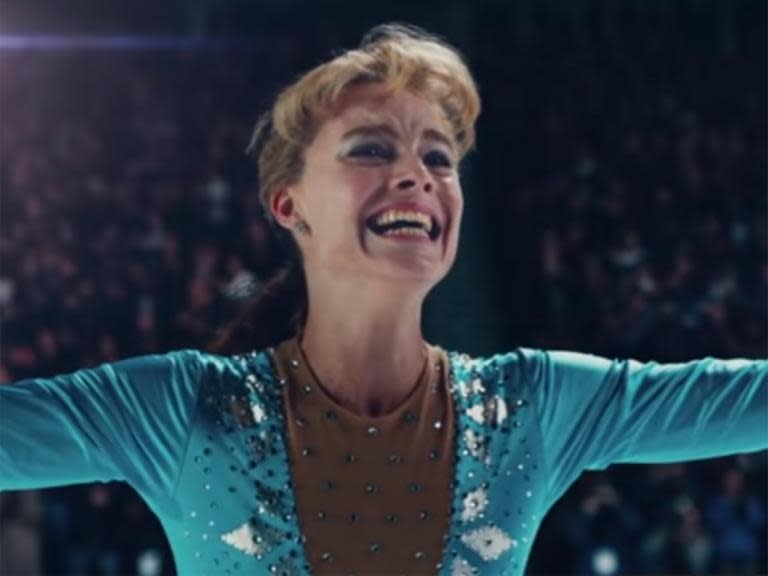I, Tonya review: Truth is relative in this bleak comedy-drama
Dir Craig Gillespie, 119 mins, starring: Margot Robbie, Bobby Cannavale, Sebastian Stan, Mckenna Grace, Allison Janney
I, Tonya is a proudly redneck affair, a comedy-drama based on true events whose protagonists know that they are being sneered at and mocked by mainstream America as “boobs”. They react by giving their critics the collective finger.
The film purports to tell the story of the figure skater Tonya Harding, and of her role in the notorious hammer attack on her main rival, Nancy Kerrigan, in the run-up to the 1994 Winter Olympics. The skating, though, is secondary. Director Craig Gillespie is far more interested in Tonya’s life outside the rink than in her celebrated triple axels on it.
Gillespie takes great pleasure in filling his movie with unreliable narrators whose accounts of what led to the Cobo Arena attack on Kerrigan in 1994 are every bit as erratic as their own behaviour at the time.
If you want a fuller understanding of the complexities behind the Tonya Harding story, turn to Nanette Burstein’s excellent ESPN documentary, The Price of Gold, in which Harding features prominently. If you want a rollicking and irreverent sports movie that shows up snobbery and hypocrisy in the media, I, Tonya fits the bill.
Tonya (played with tremendous energy by Margot Robbie) defies any attempts to categorise her as either the heroine, the villainess or the victim in her own story. Instead, she is all three. As a kid growing up in straitened circumstances in Portland, Tonya has it very tough indeed – and then she reaches adulthood and it gets even worse.
Her mother LaVona (Alsion Janney) is a bespectacled, chain-smoking, alcoholic waitress and single mom who talks to camera with a bird perched on her shoulder, making her look disconcertingly like a female Long John Silver.
She is a bully with an acidic tongue. Depending on your point of view, she is either an abusive parent or a blue collar equivalent of a tiger mum whose cruelty is premeditated to toughen Tonya up and make her fulfil her potential. In one grotesque scene, she won’t even allow her young daughter a bathroom break. When Tonya pees on the ice, she simply tells her to “skate wet”.
After Tonya marries the hapless, seemingly mild-mannered Jeff Gillooly (Sebastian Stan), he soon takes to wife battering. (“You’re a dumb piece of shit who thinks she deserves to get hit,” is her mother’s typically unsympathetic response to her plight.) Her father, briefly glimpsed in the early scenes, teaches her to hunt but then disappears from her life after yet another row with Lavona.
The filmmakers accentuate the bleakness of Tonya’s background. Belgian cinematographer Nicolas Karakatsanis lights I, Tonya in very harsh and unflattering fashion. As Tonya, Robbie has seldom looked less glamorous than she does here. As a teenager, she has braces. As a young adult, her skin is pale and her make-up is garish.
“We also judge on presentation,” the skating authorities tell Tonya and that is where she always falls down. She is not the ice princess either they or the media want. Her mother’s typically dismissive critique of one of her daughter’s less graceful performances, namely that she skates like “a graceless bull dyke”, seems to be shared by most of the judges. Her courage and athleticism are conveniently ignored.
The story, which the opening inter title tells us is based on “irony free, wildly contradictory, totally true interviews”, is told in flashbacks and flash forwards. This deliberately scattergun approach helps Gillespie avoid the straitjacket of chronology that is so stifling in most sports movies.
It also enables the director to stage documentary-like scenes in which Tonya, her mother, Gillooly and the sleazy local journalist and TV producer (Bobby Cannavale) talk directly to camera. A puffy and middle-aged Tonya is pictured in the “present day”, sitting in her kitchen, smoking away with a pile of dirty washing up in the background.
In its use of flippant humour to deal with dark subject matter, the film has a similar tone to that of the satirical 1990s Holly Hunter drama, The Positively True Adventures of the Alleged Texas Cheerleader-Murdering Mom (based on a similar story about a mother accused of having her daughter’s classmate bumped off to improve the daughter’s chances of making the cheerleading team).
The danger with both films is that they risk trivialising the events they depict and becoming patronising towards their own protagonists. At times, I, Tonya comes close to caricaturing Harding in exactly the same way that the media did at the time of the Nancy Kerrigan scandal.
She’s the uneducated, trailer trash skater whose antics make her the butt of the joke. Thankfully, Robbie brings such passion and drive to the role that she transcends the film’s more garishly cartoonish elements. Like her mother, she’s a fighter. If Jeff hits her, she’ll hit back. Her most likeable quality is the way that she always rolls with the punches. Harding has already given the movie her blessing.
The scheme to nobble Nancy Kerrigan was poorly thought out and even more poorly executed. Gillespie and screenwriter Steven Rogers cast no new light whatsoever on an incident which even now, 30 years later, remains shrouded in ambiguity.
The question of whether Harding actually realised her husband’s dim-witted henchmen were planning the attack on her rival has never been satisfactorily resolved. Jeff implicated her and she made a partial admission to knowing more than she let on.
It seems very doubtful, though, that she intended any physical harm to befall her rival. The incident made her one of the most famous people on the planet and provided the media with a scandal they found irresistible – and Kerrigan recovered in time for the Olympics anyway.
I, Tonya doesn’t pretend to be investigative journalism. The Rashomon-effect is at work here. As in the classic Japanese movie, the truth is relative. Different witnesses tell the same story in very different ways.
What does emerge from every account is that Tonya Harding was a force of nature, single-minded, very tough and always ready to keep on fighting, even if she had the fatalistic view that people from her background simply weren’t allowed to become winners. The greatest irony, though, is that even in disgrace and defeat, she is far better remembered today than any of her other rivals.
I, Tonya hits UK cinemas 23 February.

 Yahoo Movies
Yahoo Movies 

